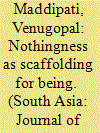| Srl | Item |
| 1 |
ID:
159382


|
|
|
|
|
| Summary/Abstract |
This essay attempts to open up a conversation between M.K. Gandhi and contemporary ecological thought. Unlike ecologists, who think through the human and then reach for a wider post-human ecology, in the 1930s, Gandhi journeyed in the reverse order, arriving at an emphasis on human withdrawal into nothingness after initially thinking through the withdrawal into nothingness of an infinitely extended, non-human, celestial being. The essay explores Gandhi's emerging anthropocentric conception of the piety of nothingness in the context of a household plan designed for him in 1936–37 by Madeline Slade, in the village of Segaon in Maharashtra. The essay draws out the architectural and political entailments of Gandhi's anthropocentrism and his emphasis on varnashramadharma.
|
|
|
|
|
|
|
|
|
|
|
|
|
|
|
|
| 2 |
ID:
184429


|
|
|
|
|
| Summary/Abstract |
The emerging and vibrant field of environmental humanities to date has not received considerable attention in Central Asia. In light of the Anthropocene crises, there is a real urgency for maturing this field and investigating the methodological and epistemological challenges that environmental topics demand, often working across disciplinary habits and time scales. This roundtable brings together Central Asianists from a range of backgrounds to discuss the sources and scales of their investigation, their challenges and potential. The contributors discuss how particular kinds of sources such as climate models, archival manuscripts, ethnographic fieldwork and media analyses have been used to understand environmental changes in the region. In what ways do the traditions of scholars’ disciplinary training guide the scale of analysis? Looking toward the future of environmental humanities in Central Asia, this roundtable suggests paths for developing this vital field of enquiry.
|
|
|
|
|
|
|
|
|
|
|
|
|
|
|
|